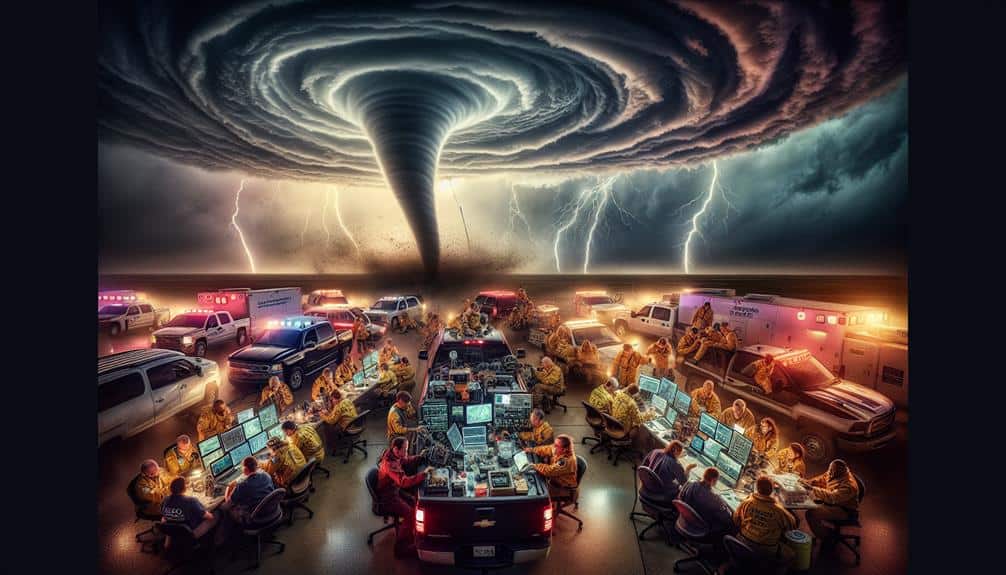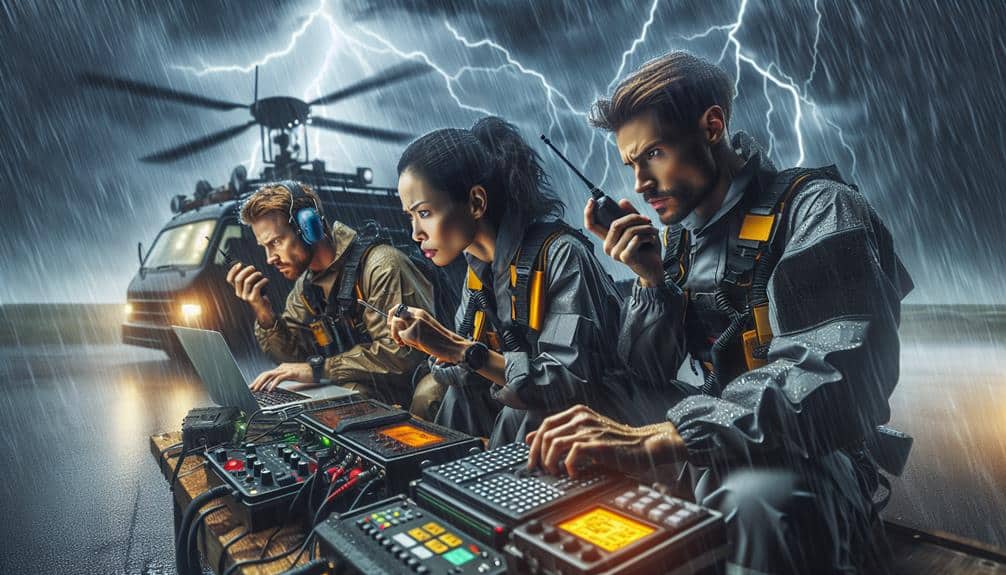We can greatly improve our psychological emergency response by focusing on three key strategies. First, we build a resilient team through intensive training and fostering mutual respect. Next, we employ effective communication techniques like active listening and empathy to secure trust and accurate information sharing. Finally, we integrate stress management practices, including mindfulness and deep breathing, to maintain our mental and emotional well-being under pressure. By strengthening our team dynamics, communication skills, and stress resilience, we're better equipped to handle psychological emergencies effectively. Understanding these strategies more deeply reveals their transformative impact on our response capabilities.
Key Points
- Rigorous training ensures preparedness and effectiveness in psychological emergency response.
- Continuous support fosters resilience and emotional stability within the response team.
- Effective communication, including active listening and empathy, builds trust and accuracy during crises.
- Stress management practices like mindfulness and deep breathing enhance decision-making and reduce anxiety.
Building a Resilient Team
A resilient team in psychological emergency response is built through rigorous training, continuous support, and fostering a culture of trust and collaboration. We've seen that team bonding plays a critical role in enhancing our collective efficacy. When we engage in exercises that challenge us together, we build not only skills but also mutual respect and understanding. This lays the groundwork for effective collaboration during high-pressure scenarios.
Leadership development is another pillar in constructing a robust team. By nurturing potential leaders within our ranks, we ensure that our team can adapt and respond to complex situations dynamically. Evidence suggests that teams with strong internal leadership are more capable of maintaining focus and morale, even when faced with adversity. It's about cultivating an environment where every member feels empowered to take initiative and make decisions.
Continuous support is equally vital. We must maintain open channels for feedback and provide ongoing training opportunities. This not only sharpens our technical skills but also reinforces our psychological resilience. By prioritizing these elements, we create a team that isn't only skilled but also deeply connected and unified, ready to face any psychological emergency with confidence and compassion.
Effective Communication Techniques
Effective communication techniques are crucial for guaranteeing that our team can respond swiftly and cohesively during psychological emergencies. To optimize our response, we must prioritize active listening. This means fully concentrating, understanding, and responding thoughtfully to the speaker. Research shows that active listening not only improves information accuracy but also fosters trust among team members, which is essential in high-stress situations.
Empathy building is another vital component. When we show genuine understanding and concern for those affected by the emergency, we create a supportive environment that can considerably alleviate distress. Empathy can be demonstrated through verbal affirmations and appropriate body language, ensuring that the individuals we assist feel heard and valued.
By integrating these techniques, we enhance our ability to communicate effectively under pressure. It's important that we practice these skills regularly to maintain a high level of proficiency. Training sessions focused on role-playing different emergency scenarios can help us refine our active listening and empathy-building skills.
In the end, effective communication empowers us, providing the freedom to act decisively and compassionately. By mastering these techniques, we guarantee that our response is both efficient and humane, ultimately leading to better outcomes for everyone involved.
Stress Management Practices
Managing stress is essential for maintaining our team's mental and emotional well-being during psychological emergencies. One effective approach is incorporating mindfulness exercises into our daily routine.
Research shows that mindfulness can significantly reduce stress by allowing us to stay present and focused. By dedicating just a few minutes each day to mindfulness, we can create a mental space that fosters clarity and calmness, crucial qualities in high-pressure situations.
In addition to mindfulness, deep breathing techniques are crucial tools in our stress management arsenal.
Studies reveal that deep breathing can lower cortisol levels and promote a sense of relaxation. When we encounter a stressful scenario, taking slow, deep breaths helps activate our parasympathetic nervous system, counteracting the body's fight-or-flight response. This physiological shift not only calms our nerves but also enhances our decision-making capabilities.
We shouldn't underestimate the power of these practices.
Frequently Asked Questions
What Are the Primary Tools Used in Psychological Emergency Response?
In the storm of a crisis, our primary tools are crisis intervention and trauma counseling. These tools act as lighthouses, guiding individuals through turbulent waters, ensuring they find the shore of stability and freedom from distress.
How Do You Assess the Mental Health Needs During a Crisis?
During a crisis, we assess mental health needs through thorough needs assessment and immediate crisis intervention. Our emergency response focuses on evidence-based methods, ensuring empathetic support for those seeking freedom from psychological distress.
What Role Do Community Partnerships Play in Emergency Response?
Community engagement and outreach are vital in crises. By fostering collaborative partnerships, we pool resources and expertise, ensuring a thorough response. Evidence shows that strong community ties enhance resilience and deliver more effective support.
How Can Technology Aid in Psychological Emergency Response Coordination?
We can leverage technology integration for effective crisis communication, providing virtual support and teletherapy services. These tools guarantee timely, accessible psychological aid, empowering individuals to seek help while maintaining their freedom and dignity during emergencies.
What Training Programs Are Essential for Psychological Emergency Responders?
We absolutely can't overstate the significance of crisis intervention and trauma counseling training. These programs equip us with essential skills to handle emergencies effectively, ensuring we provide the best support to individuals during their most vulnerable moments.


